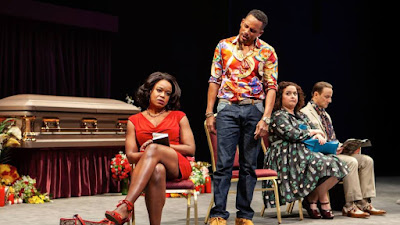Theater Review: Guirgis' Edgy Our Lady of 121st Street Entertains without Compelling
Our Lady of 121st
Street
Written by Stephen Adly Guirgis
Directed by Phylicia Rashad
Signature Theatre
The Pershing Square Theater, Manhattan
June 13, 2018
I have previously enjoyed two plays of Stephen Aldy Guirgis,
Jesus Hopped the A Train (2000) and
From Riverside to Crazy (2014), both which explore life on the underside of
New York from the perspective of its black and Latino populations (Guirgis is Egyptian-Irish,
but grew up in mixed race neighborhoods). The latter won the 2015 Pulitzer
prize, so Guirgis’ soup of combustible, overt, and repressed ethnic anger seems
quite resonant with our times. This revival of Our Lady of 121st Street (2003) by Signature Theater is
more of the same. If in the end it failed to deliver much new profound insight,
it continues to show this playwright as a skilled craftsman with a good ear for
dark humor, and a finely attuned sense for racial differences and
interrelationships in our society.
The play has a formulaic basis: the gathering of a group of
ex-high school classmates from a mixed-race Manhattan Catholic high school for
the funeral of their not-so-beloved teacher Sister Rose. Rose is remembered for her mix of tough love and meanness.
Things get off to a bad start when her body disappears, delaying the ceremony
and forcing the classmates to hang around one another longer than perhaps is
desirable (we never do find out what happened to her body). Guirgis avoids the
usual high school reunion stereotypes of ex-lovers reuniting, bullied kid made
good, etc. His varied characters all have distinct, and distinctly edgy
personalities that abrade one another from start to finish. They include a
not-so-out gay couple working out their issues, a part-time hooker (without a
heart of gold), a foul mouthed female narcotics addict, a burned-out priest who
cannot tolerate the confessional booth any longer, and a crotchety ex-cop who
has somehow lost his pants.
I liked the mix of anger and humor—perhaps reflecting
Mr. Guirgis’ Irish background, and his refusal to fall into stereotypes for the
most part. He seems least comfortable writing convincingly for the gay couple
without resorting to traditional butch-femme roles, but overall he nails most
of the characters. His humor allows him to take a pretty dim view of all of
them without the whole thing becoming grim and cynical. His worldview is that
people are pretty much out for themselves, and only perform benevolence when
there is a good reason to do so. There are a number of plot twists—a big one
hinges around a seemingly benign, cognitively-impaired young man who no one takes
seriously, but actually has quite an independent, and ominous life circulating
in the Harlem streets. Acting standouts were John Doman as Father Lux (who
definitely gives off no healing light), Quincy Tyler Bernstein as Inez, a
perpetually angry jilted wife of a rap star, and John Procaccino as Victor, who
lost his pants immediately before the play starts. The direction of Phylicia Rashad
keeps everything moving at a crisp pace, appropriate for the play. The very basic
sets portraying a bar, a confessional, and a funeral parlor were minimalist, functional and
non-distracting.
The 12 characters are so distinctly portrayed that there is
never any confusion or wondering why the author inserted so many. In this he
reminds me of the feat of Eugene O’Neill balancing and underlining each of his
17 characters in The Iceman Cometh. But
where O’Neill somehow achieves a cosmic everyman significance with his large
cast, Guirgis does not. Our Lady is a
funny, entertaining, foul-mouthed set of character sketches, virtuosic in its
construction and dialogue, but never takes that last step to making me really
reflect about its subject matter of failed lives and the interdependence of
people on each other (again like the theme of The Iceman Cometh).


Comments
Post a Comment